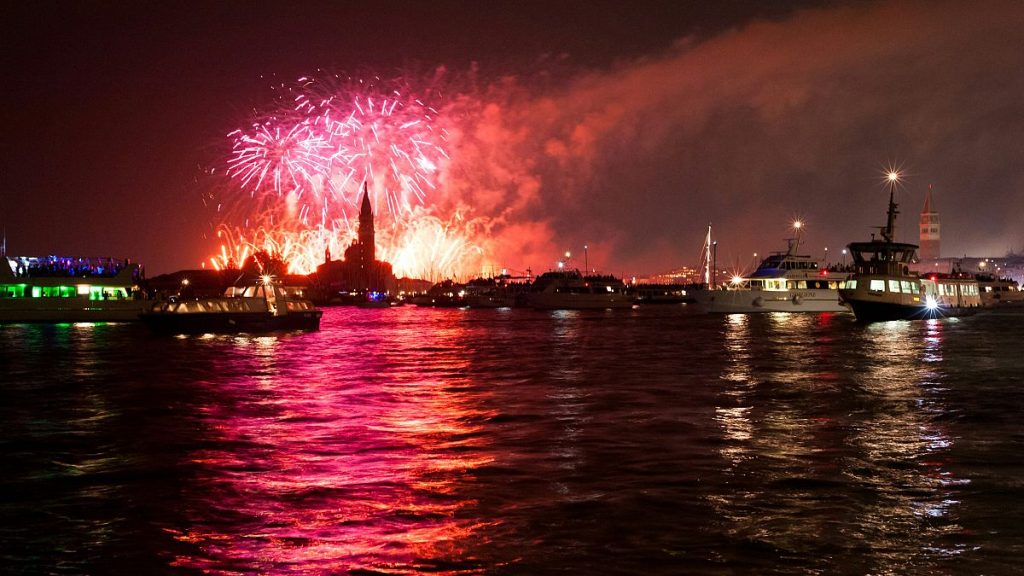New Year’s Eve Restrictions on Alcohol and Public Gatherings in Global Cities
As the world prepares to usher in the New Year, several cities are implementing restrictions on alcohol consumption and public gatherings to maintain safety and order during the festivities. These measures aim to prevent rowdy behavior, overcrowding, and potential safety hazards associated with large celebrations.
Venice, renowned for its canals and romantic atmosphere, has enacted a comprehensive ban on carrying or consuming drinks in glass containers, both alcoholic and non-alcoholic, in public spaces from 7 pm on December 31st to 6 am on January 1st. Additionally, the sale of all beverages in glass bottles, closed cans, or capped plastic bottles is prohibited during the same period, impacting bars, restaurants, and even outdoor establishments. The city has also banned pepper spray. These restrictions, implemented by Mayor Luigi Brugnaro, are intended to address safety and public order concerns. Violators face fines ranging from €25 to €500.
Tokyo’s bustling Shibuya district, known for its vibrant nightlife and iconic Scramble Crossing, has extended its existing ban on public drinking to include New Year’s Eve. The ban, in effect from 6 pm to 5 am, aims to curb disruptive behavior in the popular party zone. Furthermore, Shibuya has canceled its renowned New Year’s Eve countdown event for the fourth consecutive year due to safety concerns surrounding large crowds, which historically reached up to 120,000 people. The district will also erect temporary barriers around the Hachiko statue, a significant landmark, to manage pedestrian flow. Alcohol sales in shops are also temporarily suspended during the New Year period.
Strasbourg, France, has implemented a ban on both the sale and consumption of alcohol in public areas from noon on December 31st to noon on January 1st. In addition, a curfew will be enforced for individuals under 16 years old unless accompanied by a parent or guardian from 10 pm on December 31st to 6 am on January 1st.
Lyon, another French city, has imposed restrictions on alcohol consumption in public streets from 5 pm on December 31st to 11 am on January 1st. The sale of alcohol is prohibited from 8 pm on December 31st to 9 am on January 1st. Lyon is also taking preventative measures against potential firework-related incidents by prohibiting the sale, purchase, possession, and transportation of fireworks from 6 am on December 30th to 6 am on January 3rd.
These measures reflect a growing trend amongst cities worldwide to prioritize public safety and order during large-scale celebrations like New Year’s Eve. By restricting alcohol consumption and managing crowd sizes, these cities aim to mitigate potential risks and ensure a peaceful transition into the new year. Travelers planning to visit these destinations during the New Year period should be aware of these restrictions and plan their festivities accordingly. The specific regulations vary by city, highlighting the importance of checking local guidelines before traveling.
The restrictions implemented in these cities highlight a broader trend towards managed celebrations. Concerns about public safety, crowd control, and the potential for disruptive behavior have led authorities to adopt a more proactive approach to managing large-scale events. The COVID-19 pandemic further emphasized the importance of crowd management and public health considerations, influencing the decisions of many cities to restrict or modify traditional New Year’s Eve celebrations.
While these restrictions may impact the spontaneity of celebrations for some, they underscore the importance of responsible enjoyment and collective well-being. By implementing these measures, cities aim to strike a balance between allowing residents and visitors to enjoy the festivities while minimizing potential risks and disruptions. Travelers should be aware that these restrictions are subject to change, and it’s advisable to check for updated information closer to the date of travel.
The varied approaches taken by these cities reflect the specific challenges and priorities of each location. Venice’s comprehensive ban on open containers addresses concerns about broken glass and potential injuries in the densely populated canal city. Tokyo’s Shibuya district aims to curb rowdy behavior associated with public drinking, while also mitigating crowd control challenges at the famous Scramble Crossing. The French cities of Strasbourg and Lyon have implemented curfews and alcohol restrictions to maintain public order and prevent potential disturbances.
These measures also highlight the evolving nature of public celebrations in an increasingly complex world. As cities grapple with issues of safety, security, and public health, they are adapting their approaches to managing large-scale events. This trend towards managed celebrations is likely to continue in the future, with cities increasingly implementing strategies to balance public enjoyment with safety and order.
For travelers, understanding and respecting these local regulations is crucial for a smooth and enjoyable experience. By familiarizing themselves with the specific rules and guidelines in place, visitors can contribute to a safe and respectful environment for everyone. These restrictions are not intended to dampen the spirit of celebration but rather to ensure that everyone can enjoy the festivities responsibly and without incident. The focus is on creating a positive and safe experience for residents and visitors alike.














